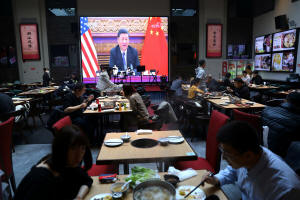Analysis-Hours of talk, but little change after Biden-Xi virtual meeting
 Send a link to a friend
Send a link to a friend
 [November 16, 2021]
By David Brunnstrom, Yew Lun Tian, Michael Martina and Gabriel
Crossley [November 16, 2021]
By David Brunnstrom, Yew Lun Tian, Michael Martina and Gabriel
Crossley
WASHINGTON/
BEIJING (Reuters) - U.S.
President Joe Biden and Chinese leader Xi Jinping just completed their
longest exchange as world leaders - but three and a half hours of talks
appear to have done little, if anything, to narrow divergent positions
between the superpowers.
China's state media described the meeting as "frank, constructive,
substantive and fruitful."
A senior U.S. official said the talks, held by video conference, went on
longer than expected and the two sides discussed a wide range of issues
from Taiwan, to trade, to North Korea, Afghanistan and Iran.
There was nothing from the respective readouts to immediately suggest
that either side had softened increasingly entrenched positions that
have brought relations between the world's two largest economies to a
historically volatile point, particularly over the issue of Taiwan.
And it was hard to see any definitive impact. "It appears they exchanged
views about everything under the sun, but announced no decisions or
policy steps," said Scott Kennedy, a China expert at Washington's Center
for Strategic and International Studies think tank.

"Perhaps that will be revealed in the coming days, but if not, this
ended up being a recitation of both sides’ basic positions. They seem to
agree that the relationship needs to have some guardrails and stability,
but they don’t agree about how to get there."
The senior U.S. official said after the meeting that the purpose of the
exchange from the U.S. side was not particularly to ease tensions, nor
necessarily was that the result.
"We were not expecting a breakthrough," the official said. "There were
none to report."
Chinese media said Xi had said he hoped Biden could demonstrate
"political leadership" to bring U.S. policy towards China back to a
"rational and practical" track, but appeared to offer little incentive
for that, only ominous warnings.
On the key potential flashpoint of Taiwan, Xi said China would have to
take decisive measures if pro-independence forces crossed a red line,
while saying that the U.S. and China were "like two ships that should
not collide."
Daniel Russel, who served as the top U.S. diplomat for Asia under former
President Barack Obama and is now with the Asia Society think tank,
noted it had taken 10 months for the leaders to get to the point of
face-to-face talks, albeit held virtually, and suggested more could be
coming.
[to top of second column]
|

A screen shows Chinese President Xi Jinping attending a virtual
meeting with U.S. President Joe Biden via video link, at a
restaurant in Beijing, China November 16, 2021. REUTERS/Tingshu Wang

"We should think of this not as a one-off
sort-of-summit, but as one in a series of important conversations
that can steer the relationship on a steadier course while the two
sides continue to furiously compete," he said.
"Hopefully the Chinese side is empowering their teams to be able to
hold more authoritative talks at lower levels. But this is just the
beginning of process of working out of a deep hole and ultimately
that requires more regular engagement between the two leaders
themselves."
Paul Haenle, director of the Carnegie–Tsinghua Center for Global
Policy in Beijing and a former National Security Council official,
said that while the meeting has stabilized the relationship in the
near term, "the long term structural challenges in the U.S.-China
relationship have not been addressed in any substantial way."
Despite the lack of obvious progress, some Chinese analysts were
upbeat and Wang Huiyao, president of the Center for China and
Globalization in Beijing, said that the meeting sent a "very
positive signal."
"I think it will stop the downward spiral of bilateral relations and
will stabilize U.S. China relations for some time," he said, adding
that it should also help reduce tensions in the Taiwan Strait.
Wu Xinbo, director of American Studies at Shanghai’s Fudan
University, said the meeting continued the positive trend of
improving bilateral ties following a phone call between Biden and Xi
in September.
"I think both sides will turn their attention to increasing
cooperation and more effective management of their differences, so
as to minimize the negative impact of the frictions on bilateral
ties," he said.
(Reporting by David Brunnstrom and Michael Martina in Washington and
Yew Lun Tian and Gabriel Crossley in Beijing; Editing by Heather
Timmons and Raju Gopalakrishnan)
[© 2021 Thomson Reuters. All rights
reserved.] Copyright 2021 Reuters. All rights reserved. This material may not be published,
broadcast, rewritten or redistributed.
Thompson Reuters is solely responsible for this content.
 |